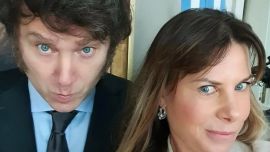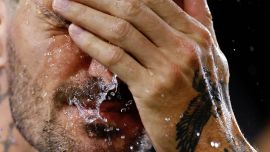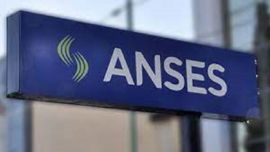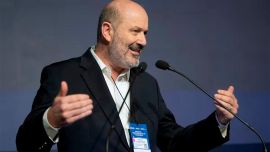Leftist Pedro Castillo was sworn in as Peru's fifth president in three years Wednesday on the 200th anniversary of the country's independence, promising an end to corruption and a new constitution.
The 51-year-old rural schoolteacher enters the job with a lengthy to-do list: tame the coronavirus epidemic, reactivate a flagging economy, and end years of political turmoil.
"I swear by God, by my family, by the peasants, by the indigenous peoples, by the ronderos ("peasant patrols"), fishers, professionals, children, adolescents, that I will exercise the office of president of the republic," Castillo declared before Congress.
"I swear by the people of Peru for a country without corruption and for a new constitution," he said, coming back to a campaign promise to change Peru's free-market friendly constitution.
The existing charter, promulgated in 1993, is a relic of ex-president Alberto Fujimori, serving jail time for corruption and crimes against humanity.
Immediately after the speech, the head of Congress, opposition leader María del Carmen Alva, placed the presidential sash on Peru's new leader.
Castillo then walked hand-in-hand with his wife, Lilia Paredes, to the Parliament from the Torre Tagle Palace, the seat of the Foreign Ministry, four blocks away.
Castillo was declared the victor on July 19, more than six weeks after a run-off race against rightwing populist rival Keiko Fujimori, whose allegations of voter fraud then had to be reviewed by an electoral jury.
Wednesday's swearing-in was attended by Spanish King Felipe VI, five Latin American leaders, including Argentina's President Alberto Fernández, former Bolivian president Evo Morales, and the United States education secretary, among other guests.
Some 10,000 police officers had been deployed in the capital Lima, which will also host a military parade on Friday.
'New deal' with investors
"This is the first time that this country will be governed by a peasant," Castillo told guests on Wednesday, wearing his trademark, traditional white sombrero from Cajamarca and a typical black Andean suit.
"During the election campaign it was said that we are going to expropriate [people's assets]. It is totally false. We want the economy to have order," he said, though adding he would be looking for a "new deal with private investors."
Castillo becomes Peru's first president in decades with no ties to the country's political or economic elite.
He has promised reform to ensure there are "no more poor people in a rich country," but has softened his initial campaign talk of nationalisation.
Castillo's Peru Libre ("Free Peru") party does not enjoy a majority in a fragmented congress, holding 37 of the 130 seats. Fujimori's Popular Force party has 24.
The country has been hard hit by the coronavirus epidemic. With nearly 200,000 deaths among its 32 million population, it has the world's highest reported mortality rate.
An extended pandemic lockdown in 2020 is blamed for the loss of millions of jobs and dumping the country into recession. GDP dropped more than 11 percent.
As his chief economic adviser, Castillo has appointed World Bank economist Pedro Francke, seen as a moderating influence on his boss.
Francke vowed, in an interview with AFP, that "we will not expropriate, we will not nationalize, we will not impose generalised price controls, we will not make any exchange control that prevents you from buying and selling dollars or taking dollars out of the country."
Last month, the president-elect himself declared that "we are not communists."
It is widely hoped Castillo will bring an end to years of political upheaval in Peru.
A series of corruption scandals culminated in three different presidents in office in a single week last November.
Seven of the country's last 10 leaders have either been convicted or are under investigation for graft, and Fujimori faces an imminent corruption trial for allegedly taking illicit campaign funding for two previous presidential bids.
President of all Peruvians
The election campaign has also been deeply polarising, with often vehement public support on both sides of the political spectrum for the final two contenders.
"Castillo must rapidly position himself as a president of all Peruvians and not as a president of half of Peruvians," political analyst Jessica Smith told AFP.
The new president has yet to name a cabinet.
He received good wishes Wednesday from neighbouring Chile's rightwing president Sebastián Piñera, who said: "if Peru goes well, we all go well."
On Monday, Castillo received congratulations in a call with US Secretary of State Antony Blinken who "reinforced our shared commitment to promoting inclusive economic prosperity."
Castillo burst onto the national scene four years ago when he led thousands of teachers on a near 80-day strike to demand a pay rise. It left 3.5 million public school pupils without classes to attend, and compelled then-president Pedro Pablo Kuczynski, who initially refused to negotiate, to relent.
In a bid to delegitimise the protest, then-interior minister Carlos Basombrio claimed its leaders were linked to Movadef, the political wing of the defeated Shining Path Maoist guerrilla group dubbed a "terrorist" organisation by Lima.
Castillo, who had participated in armed ronderos that resisted Shining Path incursions at the height of Peru's internal conflict from 1980 to 2000, vehemently rejected these allegations.
Today, his home is guarded by ronderos brandishing canes and leather whips, and he made a special mention of them in his oath.
Near his house, Castillo has a one-hectare farm where he grows corn and sweet potatoes and raises chickens and cows. Meeting his predecessor, interim President Francisco Sagasti, at the government palace last week, he jokingly asked where he would fit all his farm animals.
Castillo said Wednesday he would not run the country from the official presidential residence, Pizarro Palace, which he suggested should be turned into a museum.
"I believe we have to break with the colonial symbols," he said in explanation, adding he would return to his schoolteacher's job at the end of his term in 2026.
– TIMES/AFP























Comments